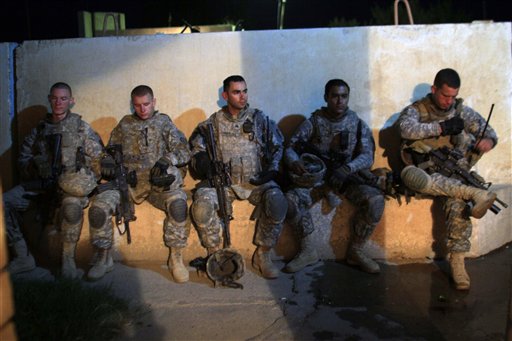Something about 21st century warfare brings out Washington’s lust for historical comparison. The moment the combat starts, lawmakers and the national press corps inevitably portray every explosion, invasion, frontline dispatch, political machination and wartime icon as momentous replicas of the past’s big moments and Great Men.
9/11 was Pearl Harbor. Colin Powell’s Iraq presentation at the United Nations was Adlai Stevenson’s Cuban Missile Crisis confrontation. Embedded journalists in Afghanistan strutted around like the intrepid Walter Cronkite on a foreign battlefield. George Bush was a Rooseveltian “war president.” The Iraq invasion was D-Day.
A byproduct of reporters’ narcissism, politicians’ vanity and the Beltway’s lockstep devotion to militarism, this present-tense hagiography ascribes the positive attributes of sanitized history to current events. And whether or not the analogies are appropriate, they inevitably help sell contemporary actions — no matter how ill-advised. As just one example: If 9/11 was Pearl Harbor, as television so often suggested, then American couch potatoes were bound to see “shock and awe” in Baghdad as a rational reprise of the atomic bomb in Hiroshima.
Of course, after we were told seven years ago that “major combat operations in Iraq have ended,” and after a historically unique conflict that has lasted longer than almost any other, you might think the press would start questioning the government’s martial stagecraft. You might also think all the comparisons to the past would stop. Instead, D.C. journalists and lawmakers are now celebrating the supposed withdrawal from Iraq, implicitly presenting the White House’s August announcement as the second coming of V-J Day.
The trouble is that the announcement is anything but, because the war isn’t even close to over. And we know that because the military is quietly acknowledging as much.
Just beyond pundits’ soaring paeans and President Obama’s history-referencing declaration of victory, the Pentagon admits “nothing will change.” That isn’t a paraphrase — it’s a direct quote from the Army’s chief spokesman in Iraq. It came just before a Colorado Springs Gazette dispatch quoted another military official saying “our mission has not changed.” The article then went on to point out that “current and scheduled deployments will resume as planned,” as 50,000 soldiers remain stationed in Iraq.
“American troops in Iraq will still go into harm’s way,” notes the Brookings Institution’s Kenneth Pollack. “American pilots will still fly combat missions in support of Iraqi ground forces, and American special forces will still face off against Iraqi terrorist groups in high-intensity operations … (The United States) will probably face casualties there in the years to come, regardless of how we label our mission there.”
The truth, in short, is clear: Despite Washington portraying this month’s Iraq announcement as another big happy event created by Great Men, the only history that’s truly germane to this moment is the kind that may portend future misfortune.
Notice that the White House has taken to saying that the remaining American troops are merely serving with the Iraqi army in an “advise-and-assist” role. Notice, too, that these same officials are now touting the Iraqification of that nation’s security.
Considering this, if historical allegory must infuse America’s foreign policy discourse, shouldn’t reporters be pondering how our government deceptively employed the same “military adviser” moniker in the disastrous Vietnam buildup? And shouldn’t elected officials remember that “Vietnamization” was the seemingly pro-withdrawal panacea floated four blood-soaked years before U.S. forces finally left Southeast Asia?
Sure they should — but they don’t because it’s easier to pretend this is just another gauzy snippet in a saccharine History Channel documentary. And it’s not just easier — as with most present-tense hagiography, pretending the Iraq conflict has concluded serves a deliberate purpose: to make America forget the altogether unglamorous consequences of permanent war.

